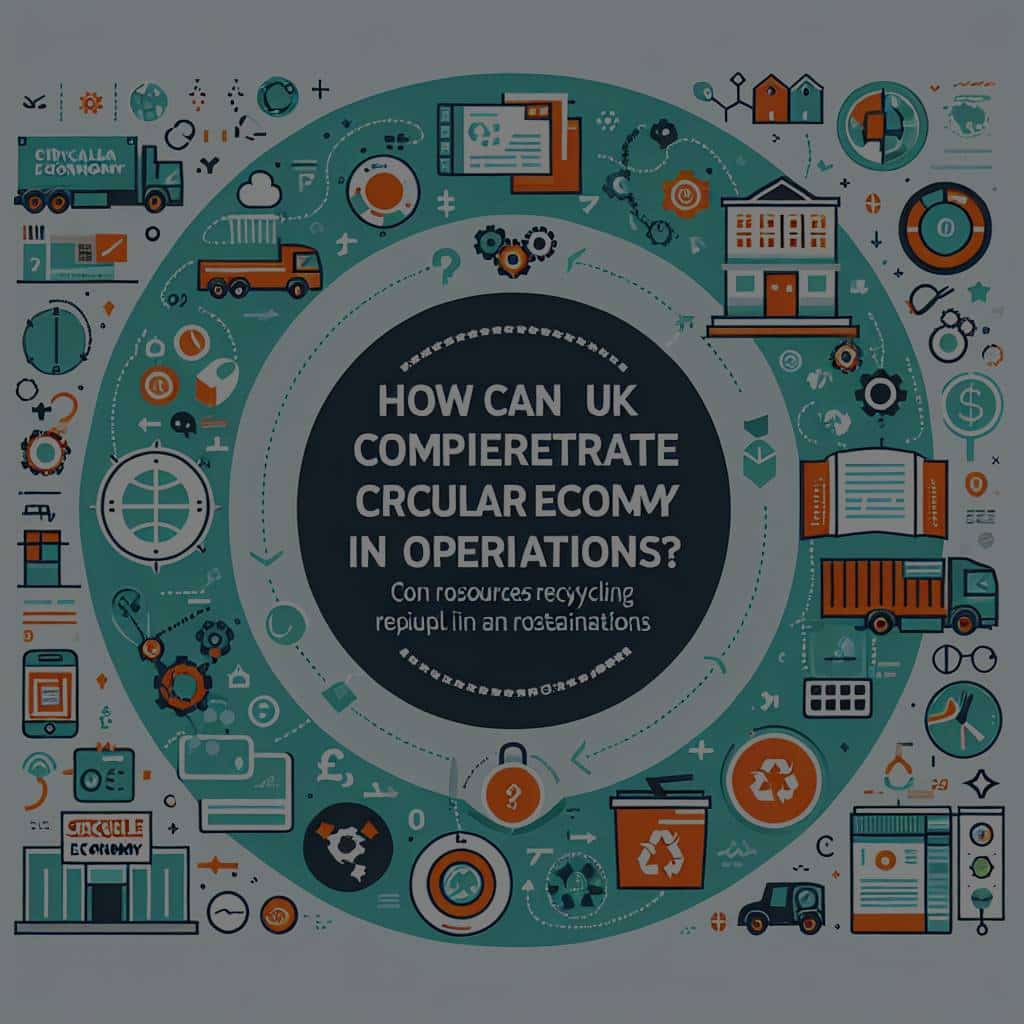How Can UK Companies Integrate Circular Economy Principles in Their Operations?

In the world of business, the race to sustainability is more than just a trend; it’s a necessity. This urgency is born out of the realization that we live in a finite world. It’s not only about saving the planet but also about the survival of the business itself. As the European Union is making great strides in promoting the circular economy, UK companies must align their strategies with this philosophy to stay competitive and ensure their longevity. The concept of a circular economy is a game-changer. It is an alternative to the traditional linear economy, where we make, use, and dispose. A circular economy involves keeping resources in use for as long as possible, extracting the maximum value from them, then recovering and regenerating products and materials at the end of each service life.
The Benefits of a Circular Economy to UK Companies
Before delving into how UK companies can integrate circular economy principles into their operations, it’s important to understand the benefits this shift would bring. Using a circular economy model, businesses can turn their waste into a valuable resource, driving innovation, reducing costs, and creating competitive advantages.
Additional reading : What Are the Implications of the UK Plastic Tax for the Packaging Industry?
A circular economy can open up new revenue streams from existing products and materials. It can also lead to cost savings, as businesses can reduce their reliance on raw materials and energy. In this new economic model, waste is seen not as a problem but as an opportunity. By repurposing waste into new products, businesses can not only reduce their environmental footprint but also create products that are competitive in the market.
By adopting a circular economy model, companies can improve their resource efficiency, strengthen their relationships with stakeholders, and enhance their corporate reputation. It can also help companies to comply with the increasing European and global regulations on waste and resource management.
In parallel : What Are the Best Content Marketing Strategies for UK Luxury Brands?
Integrating Circular Economy Principles into Business Strategy
A circular economy requires a systemic shift and cannot be achieved without changing the way businesses operate. Therefore, integrating circular economy principles into business strategy is a critical step for companies looking to make this transition.
To do this, companies will need to rethink their business models, product designs, and supply chains. This could involve moving from selling products to leasing them, designing products that can be easily repaired or recycled, using renewable or recyclable materials, or collaborating with suppliers and customers to reduce waste.
Companies will also need to invest in innovation and technology to develop new ways to recover and regenerate resources. This could include technologies for recycling or composting, or developing new products from waste materials.
Education and training are also crucial to ensure that employees understand the principles of a circular economy and are equipped with the skills to implement them. This means training staff in new ways of working, such as waste reduction techniques or sustainable product design.
The Role of Management in a Circular Economy
Leadership and management have a crucial role to play in integrating circular economy principles into a company’s operations. They need to set the vision, provide the resources, and create the culture that enables the transition to a circular economy.
Management’s role includes setting clear goals and targets, ensuring that these are aligned with the company’s overall strategy, and monitoring progress. Managers also need to make sure that the necessary resources are available, such as funding for innovation or training for staff.
It is also management’s responsibility to create a culture that supports a circular economy. This could involve encouraging employees to come up with new ideas, rewarding those who make significant contributions to waste reduction, or promoting the use of sustainable materials.
Overcoming Challenges in the Transition to a Circular Economy
While the benefits of a circular economy are significant, the transition is not without its challenges. These include technological challenges, regulatory hurdles, and the need for a cultural shift.
Technological challenges include the need for innovation in areas such as waste management, product design, and energy efficiency. This requires investment in research and development and the ability to adapt to new technologies and processes.
Regulatory hurdles can also be a barrier to a circular economy. While regulations can act as a driver for change, they can also create challenges for businesses. For example, current waste regulations may not recognize certain types of waste as a valuable resource, making it difficult for businesses to reuse or recycle it.
The need for a cultural shift is perhaps one of the most significant challenges. A circular economy requires a change in mindset, from one that sees waste as a problem to be disposed of, to one that sees it as a valuable resource to be used. This requires a change not only within businesses but also among consumers and society as a whole.
Despite these challenges, the opportunities presented by a circular economy are substantial. For UK companies that are willing to make the transition, the rewards could be significant, both in terms of financial returns and environmental benefits.
New Business Models and Supply Chain Innovations
To effectively integrate circular economy principles into their operations, UK companies will have to remodel their existing business structures. New business models can be designed around the principles of sharing, leasing, reusing, repairing, refurbishing, and recycling. For instance, instead of selling products, businesses can lease them, ensuring that when the products reach their end of life, they are returned, recycled or refurbished, and reintroduced into the supply chain.
Moreover, supply chain innovations can also play a vital role in the transition to a circular economy. For example, by collaborating with suppliers and customers to reduce waste, companies can conserve resources and reduce their environmental footprint. Rather than focusing solely on cost and efficiency, supply chains must consider environmental impacts and the potential for resource regeneration.
Companies with years of experience, like Ernst & Young Global Limited, can lead the way by showing how to implement circular economy principles. Their work in waste management and renewable energy is a prime example of how businesses can transform their operations to become more sustainable.
Regulatory and Societal Influence on Circular Economy Transition
Transitioning to a circular economy is not only a matter of corporate responsibility but is also influenced by regulatory bodies and societal attitudes. The European Commission, for instance, has launched a Circular Economy Action Plan that sets ambitious targets for waste reduction and resource efficiency.
UK companies need to remain cognizant of these regulatory changes. Not only do they represent potential risks, but they also present opportunities for those businesses prepared to adapt their operations according to circular economy principles. Regulations can drive innovation and open up new markets, providing a competitive edge to those able to respond quickly and effectively.
Societal attitudes towards sustainability and climate change also play a significant role in this transition. Companies must engage in long-term planning, considering not only their bottom line but also their societal and environmental impact. By doing so, they can gain the support of eco-conscious consumers, demonstrating a commitment to creating a sustainable future that goes beyond mere compliance with regulations.
Conclusion
The transition to a circular economy will require a concerted effort from UK companies, which includes remodeling their business operations, innovating their supply chains, and responding to regulatory and societal pressures. As Walter Stahel, a pioneer in the field, emphasized, the principles of circular economy are about "closing the loop" of product lifecycles.
Although challenges lie ahead, the potential benefits in terms of cost savings, improved resource efficiency, enhanced reputation, and regulatory compliance make the shift towards a circular economy an increasingly attractive one for UK companies. As we move further into the 21st century, sustainability is no longer just an option – it is a necessity for long-term survival and success.
